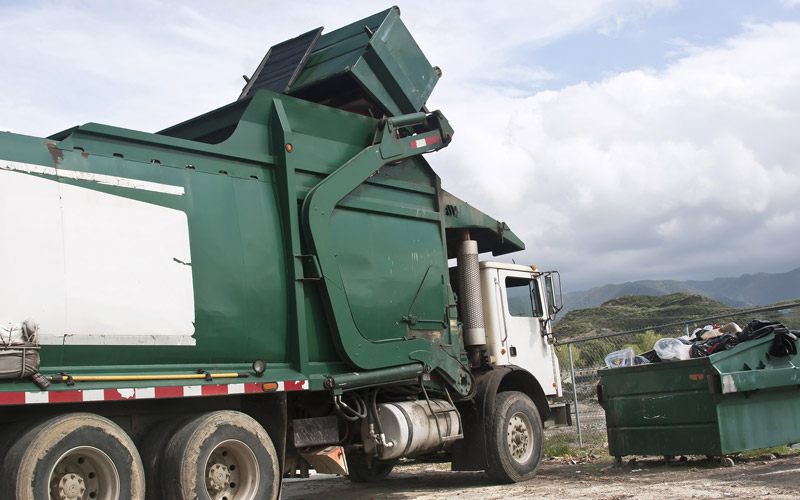
Waste transfer stations – essentially “trash rest stops” – temporarily hold and sort waste before it heads to landfills or incinerators. Photo: Shutterstock.
In New Bedford, Massachusetts, a proposed waste facility expansion threatens to bury the community under a mountain of literal and figurative problems. Parallel Products wants to transform its recycling site into a massive trash transfer station. If the project goes through, it will dump significant risks onto the low-income and immigrant populations nearby.
But what exactly is a waste transfer station, and why should we be concerned about this expansion? Let’s take a closer look at what these facilities do, how they operate, and the real impact they can have on the neighborhoods around them.
What Are Waste Transfer Stations?
Waste transfer stations are facilities where waste is held and sorted before it is sent to landfills or incinerators. It seems straightforward, but the actual costs emerge if you dig a little deeper. As the waste industry profits from these “trash rest stops,” nearby communities get no rest. From pollution and noise caused by large trucks coming and going to decreasing property values, the impacts of transfer stations keep piling up.
The proposed facility in New Bedford would process about 1,500 tons of waste daily. That means hundreds of large, waste-filled trucks would pass right by residential neighborhoods every day. They will add noise, air pollution, and traffic to an area already struggling with environmental burdens – including multiple hazardous waste sites and an active landfill within just a couple of miles from the proposed facility. While waiting to be shipped out of state, the waste would release toxic odors and emissions, leaving residents to deal with the fallout. Simply put, that stinks!
What’s at Stake?
Waste transfer stations bring nothing but headaches – literally! – for those forced to live in their shadow. That is particularly concerning for the low-income families, immigrants, and people of color whose backyards too often become the dumpsites for this and other polluting infrastructure.
New Bedford residents already face higher pollution levels and related health issues due to other industrial threats in the area. Here, neighbors currently suffer higher rates of asthma, cancer, and other severe health conditions. Adding a massive transfer station would deliver another blow to a community already pushed to its limits.
What’s the Solution?
In New Bedford, CLF and our partners at South Coast Neighbors United are fighting back. We’re challenging this transfer station and taking action to ensure those most affected have their voices heard. After all, those on the frontline know what’s at stake.
But New Bedford’s struggle highlights a larger issue with how New England – and the U.S. – handles waste. Transfer stations distract us from actual solutions to reducing waste. Trash companies have no interest in change – they profit from the mess.
The solution is twofold: First, we must stop more waste facilities from being built. And second, we need to tackle the root of the problem by investing in sustainable solutions. We need to force big plastic polluters to clean up their act and stop generating so much trash, make city-wide food composting systems accessible to everyone, and pass stronger laws and incentives—like bottle bills—that prevent recyclable materials like glass from becoming landfill bulk. These are far better strategies than wasting millions of dollars parading trash through vulnerable communities.
We want everyone to have a real say in shaping their future. That’s why we are pushing to pass stronger environmental justice laws across New England.
What Does Success Look Like? Time to Take Out the Trash
It’s time to think outside the trash bin. Successfully managing our waste requires overhauling the system, not focusing on individual waste facilities. We need a system that doesn’t sacrifice people’s health and well-being for convenience and profit.
In New Bedford, we want to stop the expansion of the Parallel Products facility and ensure residents have a real say in what happens in their neighborhoods. Achieving this would mean cleaner air, less traffic, and a healthier environment. But our work doesn’t stop there. Our communities also deserve a waste management system that prioritizes people over profit. Polluting and harming public health should have no business in Massachusetts – or anywhere else.
What’s Next?
The fight is far from over. CLF will continue to work alongside New Bedford residents, pushing for smarter waste management practices and better protections for our most vulnerable. We’ll also work to ensure that everyone has a voice in decisions that affect their lives, no matter what language they speak.
CLF is committed to transforming our waste systems by advocating for stronger recycling laws, better food waste policies, and zero-waste practices that will reduce our reliance on landfills, incinerators, and “trash rest stops,” too.



